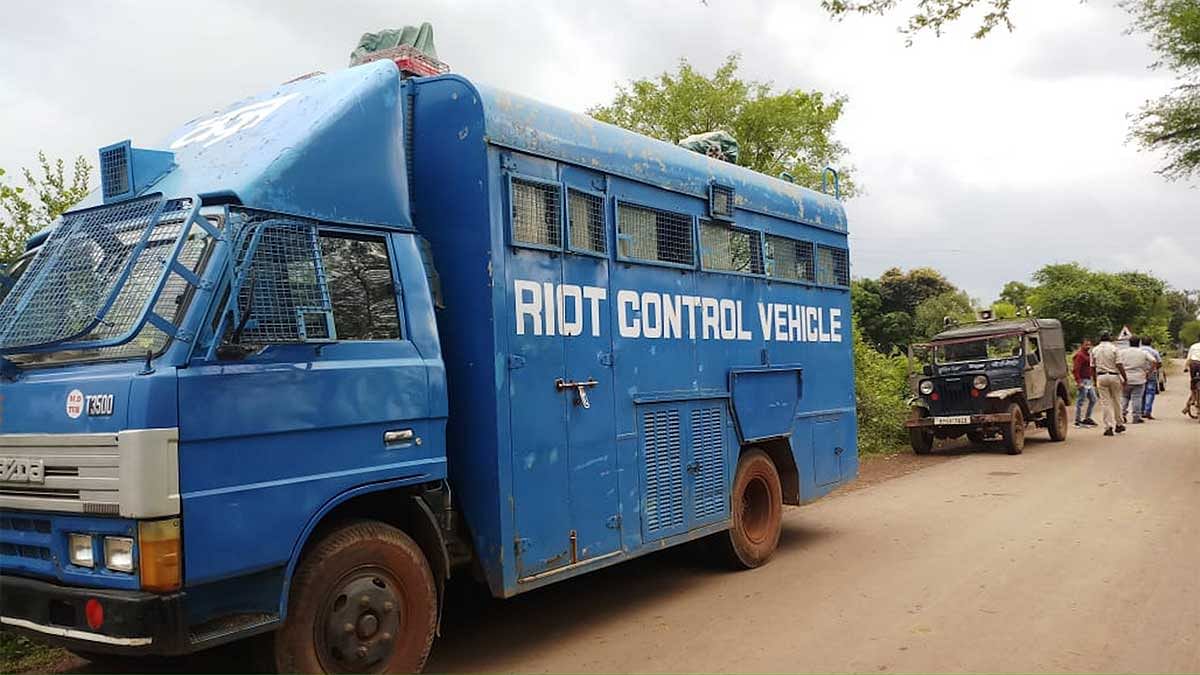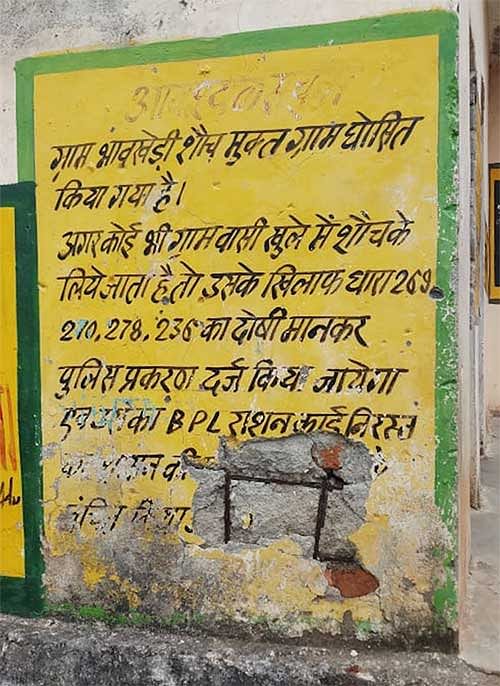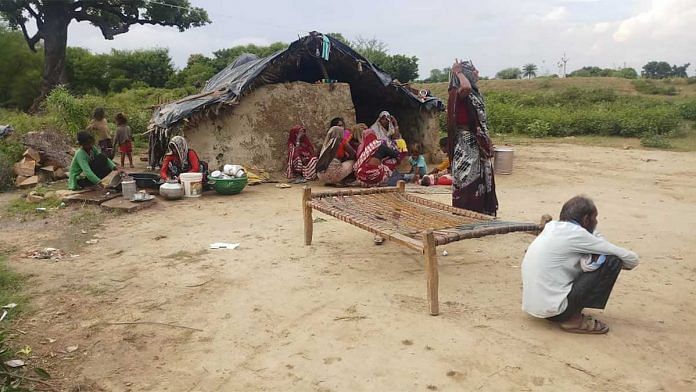Shivpuri (MP): Roshni, 12, one of two Dalit children beaten to death in Shivpuri, Madhya Pradesh, allegedly for defecating near the house of a Yadav family, dreamt of becoming a doctor.
But the child, who lost her mother four years ago, had stopped going to school after suffering casteist harassment at the hands of teachers, her family told ThePrint.
Her nephew Avinash Valmiki, 10, the second victim, was never a keen student but went to the school to play pebbles with other children.
“He used to help his mother out in the household when I went to the city looking for work,” said Manoj Valmiki, Roshni’s elder brother and Avinash’s father.
He also loved mango candy, his sister Poonam added. “He would fight with us occasionally for mango candy,” she said, seated beside her sobbing mother, Sampad Bai.
The murder of the two children in MP’s Bhavkhedi village has triggered a wave of shame and anger in the country — the pain of the family brought home by photographs of grieving women seated near two tiny corpses covered in a white shroud.
Also Read: India’s caste & untouchability had a role in Pakistan’s creation, writes Islamabad columnist
‘Plan to leave the village’
There has been heavy police presence in Bhavkhedi since 26 September, the day the children were killed.
A riot control vehicle is parked outside the house of Kalla Valmiki, Roshni and Manoj’s father, with armed personnel guarding the premises.

Roshni and Avinash’s family forms the only Valmiki household in Bhavkhedi, which lies some 300 kilometres from state capital Bhopal, though there are a few families from the Jatav community, another Dalit sub-group.
The Valmiki family lives in two huts, one that belongs to Kalla Valmiki and the other to Manoj.
While Valmiki and his family live at the starting point of the village, Manoj lives a few metres away.
On Thursday morning, Roshni and Avinash, seeking a place to defecate, found a spot a few metres away from the house of a Yadav family.
When Hakim and Rameshwar Yadav, the two prime suspects, spotted them, they bore down on the children with sticks and stones, according to the FIR. The two were hit on their heads and faces, it adds.
The children died, and the family of the accused, including sarpanch Suraj Yadav, fled the village amid the ensuing uproar.
Manoj, however, alleged that the crime went deeper than caste differences alone. “The accused had tried to molest Roshni while she was defecating on the road and even tried to film them,” he said.
“Avinash protested and that’s when the incident took a violent turn,” he said.
This angle is currently not on the police’s radar.
“The investigation so far is on charges under Section 302 (murder) and SC/ST Act,” said Sirsod police inspector R.S. Dhakad. “Further charges will be added only after further investigation.”
The Union Jal Shakti Ministry, which oversees sanitation initiatives, has also weighed in on the “incident”, painting the affair as one possibly motivated by an intention to discourage open defecation.
“…Some recent media reports have been brought to the notice of this Department (Department of Drinking Water and Sanitation) which are showing that certain forms of inappropriate actions, extreme coercive actions (particularly instance of Shivpuri district, Madhya Pradesh), are still being practiced (to discourage open defecation),” the ministry said in a recent press release.
“In this regard, this Department had already issued advisory on 25th July 2017 suggesting the States to avoid any coercive measures for ensuring construction and usage of toilets,” it added.
Meanwhile, the grieving family, finds itself at sea about the road ahead, doubtful they will continue living in the village.
“I plan to leave the village for the city as my only son is dead now,” said Manoj, adding that he was scared about his two daughters and wife, who had also been harassed by the suspects’ family.
Sarpanch Suraj, he said, would encourage the behaviour of his clan and promise them protection.
A two-year-old grudge
According to Manoj, the Yadav family had borne a grudge against him since he refused to work in their field two years ago. While they wanted to pay him Rs 50 for the work, Manoj had asked for Rs 100.
A couple of months later, Manoj said, he cut down a tree across the road from the Yadav house to hold up the roof of his mud tenement.
Hakim, according to Manoj, accosted him. After a heated argument, Hakim allegedly chased him away with a rifle.
Just a day before they were killed, said Manoj, Avinash and Roshni were also accosted by Hakim when they went to fetch water from a boring tap that belonged to his family.
Hakim allegedly threatened the children that he would kill them with his licensed rifle.
When he came to know about the incident, Manoj added, he not only apologised to the Yadavs but also slapped his children for going there.
Caste discrimination a part of life
Manoj has no permanent employment and claims to have never received any job under the Mahatma Gandhi National Rural Employment Guarantee Act (MGNREGA) from the gram panchayat, a nodal agency for the government-run job scheme.
The only source of income for Manoj and his family are seasonal labour and manual scavenging in the city.
Caste discrimination, the family said, has been a part of their everyday life.
Avinash and Roshni used to play with other children from the village, but often faced casteist slur from their parents, they claim.
Manoj said they were denied entry to temples and barred from using handpumps, even though people from other communities like Jatavs were often allowed to do so.
Girls and women from their family could go to temples during Navratri, he added, but the men couldn’t.
Dreams squashed
Following Roshni’s death, Avinash’s sister Kajal is now the only literate member of the family.
When this reporter visited the village, Kajal looked tired, worn down by making arrangements for the constant stream of visitors. “Roshni didi used to take good care of all her siblings, especially after the death of her mother Leela Bai four years ago,” she said. “She loved to practice her signatures on the slate during her free time.”
Sampad Bai, Avinash’s mother, described how Roshni had to stop going to school because of the caste-based discrimination she had suffered at the hands of staff and teachers.
The children, she said, were made to carry separate mats and utensils, and sit separately from other students.
“The teachers would often ignore our children when they asked questions about their studies,” she added.
The school has been shut since the incident. ThePrint tried to contact two teachers of the school, Vimal Sharma and Satish Varma, for comment, whose names were painted on the school wall. But they didn’t reply. ThePrint will update the report when they respond.
While this reporter was interviewing the family, the state chief of the Bahujan Samaj Party (BSP), a coalition partner in the Congress-led MP government and a party that prides itself on its pro-Dalit stance, came to offer condolences to the family and promised full support. But he refused to sit on their cot or drink the water offered by the family.
But Dhaniram Chaudhary, the chief of BSP in Shivpuri, said it was not an act of discrimination. “It was a moment of mourning for us and we went there to express solidarity with them, so we didn’t want to bother them with the arrangements,” he added.
“We are in constant touch with the victims’ family and demand a sum of Rs 50 lakh as compensation for them along with five acres of land and a government job in the city,” he said.
According to the victims’ family, neither the local MP nor the MLA had come to meet or help them.
Also Read: Data shows Dalit MPs battle parties, voters and prejudice even in reserved seats
The faultlines run deep
Shivpuri-based writer and political activist Pramod Bhargava said “the village and, in fact, the whole Gwalior Chambal region is dominated by Yadav community followed by Jatavs”.
The caste faultlines of the village don’t just divide the Dalits and the Yadavs, but also Dalits themselves.
Hans Narayan Jatav, a local, proudly declared that he had built the B.R. Ambedkar statue nearby, but didn’t want to talk about Roshni and Avinash’s deaths.
“The incident has brought shame upon the village but we don’t want to be involved in it or be disturbed by it,” he said. “All the members of the Jatav community in the village have received benefits, including toilets and electrification from the panchayat,” he added.
Activist Sudheer Khode said he would organise a rally on 30 September for the victim’s family.
“The indifference of the Jatav community of this village is particularly appalling as both communities stand shoulder-to- shoulder when it comes to caste-based injustice,” he said.
“This is the only Valmiki family in the village, and so the Jatav community should stand firmly with them.”
‘Open defecation free’
The walls of the village primary school declare that “the village has been declared open defecation free and whosoever will be found to defecate in open will be prosecuted under Sections 269, 270, 278 … of the Indian Penal Code”.

These sections spell out punishment for creating a situation harmful to health, with penalties including jail time of up to six months and fines.
According to Government of India data released last week, over 5.9 lakh villages have been declared open defecation free since the launch of the Swachh Bharat Mission in 2014.
Bhavkehdi got the tag from the district administration in April 2018, according to Shivpuri zilla parishad CEO H.P. Verma.
But while Manoj doesn’t have a toilet at all, Valmiki’s is out of order. Manoj lives in a mud house with a thatched roof, the walls made of plastic and straw. It does not have electricity or an LPG connection.
Manoj claimed sarpanch Suraj Yadav told him that his name was not on the list of people eligible for aid to build toilets.
Kalla Valmiki said since there was no water supply in his toilet, it was useless and now served as a storeroom. “We are compelled to defecate in the open as there is no water supply to our toilet, so we defecate in the area near any handpump.”
When asked upon the lack of toilet facilities for Manoj, Verma said he had been living with his father when the 2011 census was conducted, on which the toilet aid was based. So, Verma added, he wasn’t eligible to get a toilet.
Also Read: Can a Dalit wear Armani and Zara? Why most Indians would still say no




As the foremost scourge / curse / blight on the Hindu religion, the elimination of the caste system should be very high up on the organisation’s road map for the twenty first century. This horrific incident comes on the eve of telling the world on 2nd October that India is ODF.
This is one thing I agree will, all of our people are one.